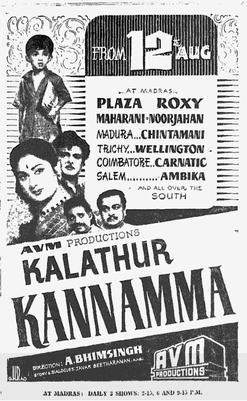
Kalathur Kannamma is a 1960 Indian Tamil-language romantic drama film directed by A. Bhimsingh and written by Javar Seetharaman. The film stars Gemini Ganesh, Savitri Ganesh and Kamal Haasan. It revolves around a couple — a wealthy zamindar's son and a farmer's daughter — who are separated due to circumstances, while their innocent son is forced to grow up in an orphanage.
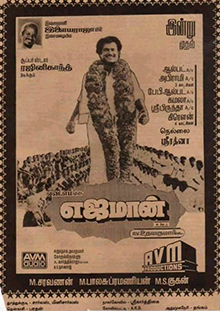
Yajaman is a 1993 Indian Tamil-language drama film written and directed by R. V. Udayakumar. The film stars Rajinikanth, Meena and Aishwarya, with M. N. Nambiar, Manorama, Vijayakumar and Napoleon in supporting roles. It was produced by M. Saravanan, M. S. Guhan and M. Subrahmaniam of AVM Productions. The film was released on 18 February 1993 and became commercially successful, with a 175-day theatrical run.

Paayum Puli is a 1983 Tamil-language martial arts film directed by S. P. Muthuraman and written by Panchu Arunachalam. Produced by AVM Productions, the film stars Rajinikanth and Radha. Inspired by The 36th Chamber of Shaolin (1978), it revolves around a meek man who learns martial arts to seek revenge for the murder of his sister. Paayum Puli was released on 14 January 1983, Pongal day. The film became a commercial success and completed a 133-day run at the box office.
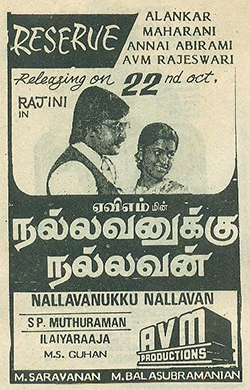
Nallavanukku Nallavan is a 1984 Indian Tamil-language action drama film, directed by S. P. Muthuraman and produced by AVM Productions. A remake of the 1983 Telugu film Dharmaatmudu, it stars Rajinikanth and Radhika, with Karthik, Thulasi, V. K. Ramasamy, Major Sundarrajan, Y. G. Mahendran and Visu in supporting roles. The film revolves around a worker who is bequeathed his late boss's business, earning the wrath of the boss's son who believes he swindled his father's business.

Pokkiri Raja is a 1982 Indian Tamil-language action comedy film directed by S. P. Muthuraman and written by Panchu Arunachalam. A remake of the Telugu film Chuttalunnaru Jagratha (1980), it stars Rajinikanth, Sridevi and Radhika. The film revolves around a man who was framed for murder, and a lookalike who aids him in finding the true killers. It was released on 14 January 1982 and became a commercial success, running for over 100 days in theatres.

Thoongathey Thambi Thoongathey is a 1983 Indian Tamil-language masala film directed by S. P. Muthuraman, starring Kamal Haasan in a double role, supported by Radha and Sulakshana. It was a blockbuster and completed a 275-day run at the box office.

Sakalakala Vallavan is a 1982 Indian Tamil-language masala film directed by S. P. Muthuraman and written by Panchu Arunachalam. The film stars Kamal Haasan, Ambika, Raveendran and Tulasi. Produced by AVM Productions, it revolves around a villager whose sister is raped by the village head's son when the former refuses to abide by his dictatorship. The villager vows to seek revenge and get his sister married to her rapist.
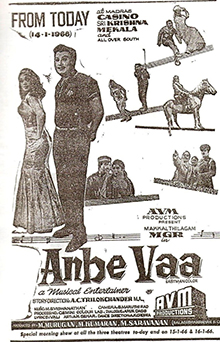
Anbe Vaa is a 1966 Indian Tamil-language romantic comedy film written and directed by A. C. Tirulokchandar. The film stars M. G. Ramachandran and B. Saroja Devi, with S. A. Ashokan, Nagesh, T. R. Ramachandran, P. D. Sambandam, Manorama and T. P. Muthulakshmi in supporting roles. Based on the 1961 American film Come September, it follows JB, a wealthy industrialist who goes on vacation to his bungalow in Shimla, only to discover that his caretaker and his wife have left for Kasi after renting the bungalow to a family. The rest of the film revolves around JB's response to this situation.

Murattu Kaalai is a 1980 Indian Tamil-language action film directed by S. P. Muthuraman, and written by Panchu Arunachalam. The film stars Rajinikanth, Rati Agnihotri, Sumalatha and Jaishankar. It revolves around Kaalaiyan, an honourable villager who, despite being wealthy, chooses to live modestly while Sundaravelu, a less honourable man from the neighbouring village, tries to grab Kaalaiyan's land.
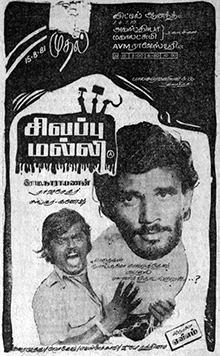
Sivappu Malli is a 1981 Indian Tamil-language film directed by Rama Narayanan for AVM Productions, starring Vijayakanth, Chandrasekhar, Shanthi Krishna, Aruna and S. S. Chandran. A remake of the Telugu film Erra Mallelu (1981), it revolves around two men starting a revolution against their village chiefs and the owner of a factory in the neighbouring village. The film was released on 15 August 1981.

Mella Thirandhathu Kadhavu is a 1986 Indian Tamil-language romantic musical film, written and directed by R. Sundarrajan, starring Mohan, Radha and Amala. It was released on 12 September 1986 and became a commercial success.

Athey Kangal is a 1967 Indian Tamil-language mystery thriller film written and directed by A. C. Tirulokchandar. The film stars Ravichandran and Kanchana. It focuses on a girl's family being stalked by a masked murderer, and her lover's attempts to apprehend him.

Major Chandrakanth is a 1966 Indian Tamil-language drama film written and directed by K. Balachander. Based on his play of the same name, the film stars Major Sundarrajan, Nagesh, R. Muthuraman, A. V. M. Rajan and Jayalalithaa. Produced by A. V. Meiyappan of AVM Productions, it revolves around a retired and blind major who gives asylum to a fugitive wanted for committing murder, unaware that the victim was his younger son.

Ramu is a 1966 Indian Tamil-language drama film directed by A. C. Tirulokchandar and written by Javar N. Seetharaman. The film stars Gemini Ganesh and K. R. Vijaya, with Ashokan, Nagesh, V. K. Ramasamy, O. A. K. Thevar and Master Rajkumar—as the title character—in supporting roles. A remake of the Hindi film Door Gagan Ki Chhaon Mein (1964), it revolves around a boy who loses his speech after witnessing his mother's death, and his father attempts to restore his son's speech.
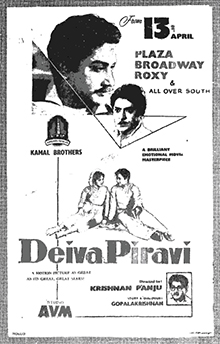
Deivapiravi is a 1960 Indian Tamil-language film, directed by Krishnan–Panju. The film stars Sivaji Ganesan, Padmini, S. S. Rajendran, K. A. Thangavelu and M. N. Rajam. The film was dubbed and released in Telugu as Anumanam and released on 24 June 1961. At the 8th National Film Awards, the film won the All India Certificate of Merit for the Third Best Feature Film. It was remade the same year in Hindi as Bindya.

Uyarndha Manithan is a 1968 Indian Tamil-language drama film written by Javar Seetharaman and directed by Krishnan–Panju. The film was produced by A. V. Meiyappan, M. Saravanan, M. Kumaran and M. Murugan under AVM Productions. It stars Sivaji Ganesan and Sowcar Janaki, while S. A. Ashokan, Major Sundarrajan, Vanisri and Sivakumar play pivotal roles. The film's soundtrack and background score were composed by M. S. Viswanathan, while the lyrics for the songs were written by Vaali.

Naanum Oru Penn is a 1963 Indian Tamil-language drama film directed by A. C. Tirulokchandar and written by K. P. Kottarakkara. The film stars S. S. Rajendran and R. Vijayakumari, with S. V. Ranga Rao, M. R. Radha, S. V. Subbaiah, C. K. Nagesh, Rajan and C. S. Pushpalatha in supporting roles. It revolves around a dark complexioned and uneducated girl and how she convinces everyone that more than appearance and education, it is the character which is important for a woman.

Annai ( transl. Mother) is a 1962 Indian Tamil-language drama film directed by Krishnan–Panju. The film stars P. Bhanumathi and Sowcar Janaki, with S. V. Ranga Rao, J. P. Chandrababu and P. Raja playing supporting roles. The plot revolves around the theme that the love of a foster mother can be even stronger than that of a biological mother.

Kaakum Karangal is a 1965 Indian Tamil-language drama film, directed by A. C. Tirulokchandar. Inspired by British writer W. Somerset Maugham's 1925 novel The Painted Veil, it was produced by Murugan Brothers, a subsidiary of AVM Productions. The film stars S. S. Rajendran and C. R. Vijayakumari, with Nagesh, L. Vijayalakshmi, S. V. Subbaiah, Sivakumar and Revathi playing supporting roles. It was released on 19 June 1965, and failed at the box office.

Thiyagu is a 1990 Indian Tamil-language drama film directed by S. P. Muthuraman and written by Sivasankari. Produced by AVM Productions, it is based on the TV series Oru Manithanin Kathai, itself based on Sivasankari's novel by the same name. The film stars Raghuvaran, reprising his role from the series. It was released on 5 October 1990, and failed commercially.




















